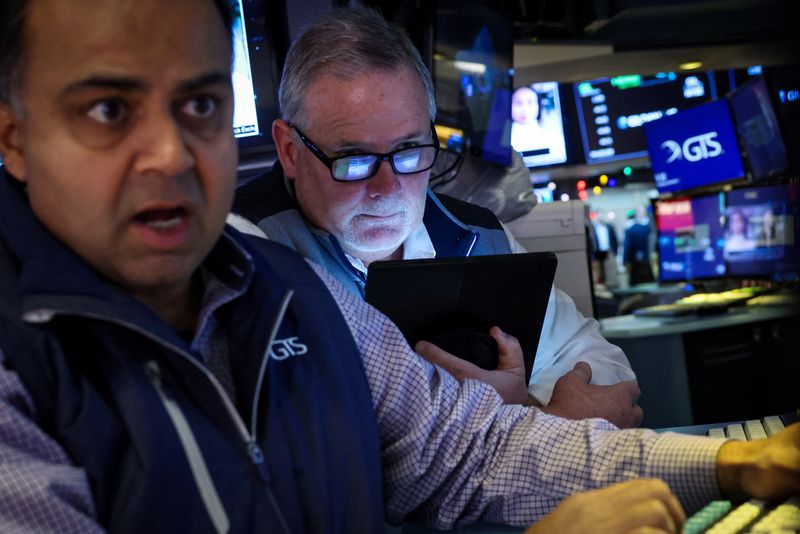Morning Bid: Long bond yields defused ahead of payrolls, France rallies
A look at the day ahead in U.S. and global markets from Mike Dolan
Somewhat counter to post-election narratives and many new year outlooks, long-dated U.S. Treasury yields continue to sink as the November payrolls report holds all the attention on Friday.
The 30-year 'long bond' yield fell to 6-week lows of 4.31%, flattening the 2-30 year U.S. yield curve gap to just 16 basis points - its lowest since August.
With the 2-10 year curve flat as a pancake near zero, bond market volatility gauges subsided to their lowest since September.
Perhaps year-end effects are at play, with another steep rise in cash-like money market fund holdings to a record $6.77 trillion in the latest week also catching eyes even as stock indexes hold near record highs.
But with economic and trade uncertainty high before Donald Trump's new administration takes office next month, and many Federal Reserve officials hesitant about another interest rate cut this year, the calming of the Treasury market is notable.
More immediately, markets need to negotiate November's jobs report.
Forecasters reckon the report will show payrolls increased by 200,000 jobs in November. But there remain nagging doubts about the labor market after October's surprisingly small 12,000 gain - the weakest since 2020 - and the unemployment rate is expected to tick up a tenth to 4.2%.
While October's low jobs reading was distorted by storms and strikes, this week's U.S. economic updates have nodded to some emerging softness - most obviously in the ISM survey of the dominant service sector but also in creeping jobless claims, ebbing hiring rates and sub-forecast private payrolls.
The U.S. economic surprise index compiled by Citi remains firmly in positive territory but at its lowest since October.
Ahead of the jobs report, Fed futures remain uncertain about another rate cut this month and price just a 65% chance of a move. Fed Chair Jerome Powell on Wednesday appeared to signal a slower pace of rate cuts ahead when he said the economy was stronger at this point than the Fed had expected in September.
The dollar perked up a bit on Friday after the prior day's slide.
FRENCH RALLY
Thursday's currency shift owed as much to a rallying euro and French bonds and stocks as political tensions in Paris appeared to ease.
French debt risk premiums versus benchmark German bunds fell after French President Emmanuel Macron said he would appoint a new prime minister in the coming days and his top priority would be getting a 2025 budget adopted by parliament.
Despite Prime Minister Michel Barnier resigning on Thursday after losing a confidence vote on the budget, Macron insisted he would remain as president until his term ends in 2027.
Far-right National Rally leader Marine Le Pen, who voted to oust Barnier, said on Thursday she had no plans to seek the removal of Macron and a budget could be passed within weeks.
French 10-year yields fell to 2-month lows, with the French-German spread compressing to two-week lows around 74bps. The CAC40 stock benchmark was up more than 1%.
The European Central Bank meets next week amid widespread expectations of another quarter-point rate cut - the fourth of the year.
In Asia, tensions remained in South Korea. The ruling party leader there said President Yoon Suk Yeol needed to be removed from power for trying to impose martial law and the government denied reports it was preparing to issue another such declaration.
The won and the main KOSPI stock index both fell again.
Chinese stocks outperformed, however, pushing aside U.S. trade-related anxieties amid expectations for fresh domestic policy support at next week's meeting of the Central Economic Work Conference - which will set the agenda and targets for China's economy for 2025.
China's ministry of finance also published draft rules that would provide incentives for government agencies to buy China-made products, fuelling bets on home-grown technologies.
Elsewhere, bitcoin recoiled below the $100,000 level it breached for the first time this week. President-elect Donald Trump said he was appointing former PayPal (NASDAQ:PYPL ) Chief Operating Officer David Sacks as his "White House A.I. & Crypto Czar", another step towards overhauling U.S. policy toward the sector.
In company news, UnitedHealth (NYSE:UNH )'s stock dropped 5.2% on Thursday after the shocking murder of its chief executive in Manhattan on Wednesday and was the biggest weight on the Dow and S&P 500 .
The S&P 500 healthcare index fell 1.1% as health insurance companies reassessed the risks for their top executives.
In deals news, Direct Line (LON:DLGD ) rose 8.5% after the British insurer said it was set to recommend a sweetened 3.61 billion pound ($4.60 billion) cash-and-stock takeover by Aviva (LON:AV ) if the bigger rival makes a formal offer.
Key developments that should provide more direction to U.S. markets later on Friday:
* US November employment report, University of Michigan December consumer sentiment survey, October consumer credit; Canada Nov employment report
* Federal Reserve Board Governor Michelle Bowman, Chicago Fed President Austan Goolsbee, Cleveland Fed President Beth Hammack and San Francisco Fed chief Mary Daly all speak
Source: Investing.com
